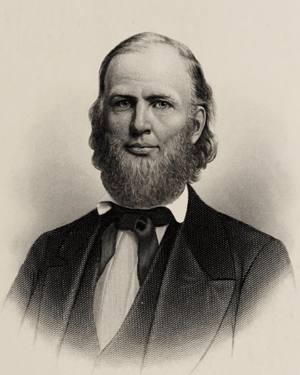Byron Paine facts for kids
Byron Paine (born October 10, 1827 – died January 13, 1871) was an important American lawyer and judge. He served as a Justice on the Wisconsin Supreme Court. Paine is famous for helping African Americans gain the right to vote in Wisconsin. He did this through a major court case in 1866.
Quick facts for kids
The Honorable
Byron Paine
|
|
|---|---|
 |
|
| Justice of the Wisconsin Supreme Court | |
| In office June 1867 – January 13, 1871 |
|
| Appointed by | Lucius Fairchild |
| Preceded by | Jason Downer |
| Succeeded by | William P. Lyon |
| In office June 1, 1859 – August 1864 |
|
| Preceded by | Abram D. Smith |
| Succeeded by | Jason Downer |
| Personal details | |
| Born |
Byron Paine
October 10, 1827 Painesville, Ohio |
| Died | January 13, 1871 (aged 43) Monona, Wisconsin |
| Resting place | Forest Hill Cemetery Madison, Wisconsin |
| Spouse | Clarissa R. Wyman |
| Children | Arthur Norman James Percy Wendell W. Byron Dixon |
| Parents |
|
| Military service | |
| Allegiance | |
| Branch/service | Union Army |
| Years of service | 1864–1865 |
| Rank | |
| Unit | 43rd Reg. Wis. Vol. Infantry |
| Battles/wars | American Civil War |
Contents
Early Life and Legal Career
Byron Paine was born in Painesville, Ohio. His family moved to Milwaukee, Wisconsin, in 1847. There, he studied law and became a lawyer in 1849. He worked with his father and brother in a law firm.
Fighting for Freedom
As a young lawyer, Paine became good friends with Sherman Booth. Booth was an abolitionist, meaning he was against slavery. In 1854, Booth was on trial for helping a runaway slave. Paine defended Booth in court without charging him any money.
Paine argued Booth's case in front of the Wisconsin Supreme Court. He said that the federal law about runaway slaves, called the Fugitive Slave Act, was unfair. Paine won the case in Wisconsin. This made him the only lawyer to successfully argue that this federal law went against the rights of northern states. However, the United States Supreme Court later overturned this decision.
Even a lawyer who disagreed with Paine, Chief Justice Edward George Ryan, praised him. Ryan said Paine was a "frank and manly abolitionist" who was very serious about his beliefs.
Becoming a Judge
In 1856, Paine worked for the Wisconsin State Senate. In 1857, he was elected as a Judge in Milwaukee County. He served there until he was elected to the Wisconsin Supreme Court in 1859.
Serving in the Civil War
Paine's first term on the Supreme Court was supposed to end in 1865. But in 1864, during the American Civil War, he decided to leave his judge position. He joined the Union Army to fight for the United States.
He became a lieutenant colonel in the 43rd Wisconsin Volunteer Infantry Regiment. His regiment was sent to Tennessee. They helped protect important railroad lines and supplies. They also fought in some battles near the end of the war.
Return to Law and the Supreme Court
After the Civil War, Paine went back to Milwaukee to practice law. He took on another very important case about civil rights.
Voting Rights for African Americans
In 1866, Paine represented Ezekiel Gillespie in a case called Gillespie v. Palmer. Gillespie was a former slave. He had tried to vote in Milwaukee in 1865 but was not allowed. Paine argued that Wisconsin had already given African Americans the right to vote back in 1849. This law had just been ignored for 17 years.
The Wisconsin Supreme Court agreed with Paine. They ruled that African Americans did have the right to vote in Wisconsin. This was a huge victory for civil rights.
In 1867, a judge named Jason Downer resigned from the Wisconsin Supreme Court. Wisconsin Governor Lucius Fairchild then appointed Byron Paine to fill the empty spot. Paine served on the Supreme Court again until he passed away in January 1871.
Family Life
Byron Paine was married to Clarissa Wyman. They had five sons together, but only three lived past infancy. Paine loved to read and study different subjects, including theology (the study of religion).
He died on January 13, 1871, in Monona, Wisconsin.
 | Percy Lavon Julian |
 | Katherine Johnson |
 | George Washington Carver |
 | Annie Easley |

